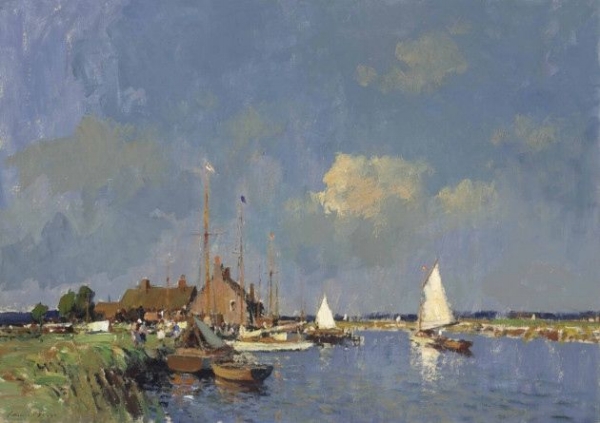An Embarrassing Incident on the Norfolk Broads: ‘Hope for the Best, Prepare for the Worst’
Edward Seago, Summer on the Norfolk Broads
Many, many summers ago Dad took us all on holiday to the Norfolk Broads. Mum, five kids, Aunty Mary, her friend Frances, and a springer spaniel all squeezed onto a great metal tub of a boat that he had selected from the Hoseasons brochure.
We plotted courses on maps, fished for eels, ran along the top deck with the dog, and periodically helped moor the boat at the quayside. Dad stood on the bridge in a captain’s cap, smoking Embassy, relishing the peace and solitude.
One evening Dad took Martin and me to the pub before dinner. We got talking to a middle-aged couple who were clearly rather nautical, but new to the Broads. Though he didn’t confess it to our new acquaintances, Dad was far from an expert mariner. This was his first serious outing on the water, and we’d already had an incident when the boat got stuck under a low hanging bridge. Dad was however a confident conversationalist, and he enjoyed giving advice on the places to stop at Wroxham and Beccles, the best way to tackle the currents at Yarmouth, and so forth. The middle-aged couple nodded appreciatively.
The next morning we set off quite early. It was all hands on deck as Dad barked instructions from the helm. Unfortunately, in the excitement, he confused his forward and reverse gears and drove the big metal tub straight into a small, smart boat that was moored nearby. To our shock and dismay, out popped the irate heads of the middle-aged couple from the night before.
‘It’s him!’ they cried.
I’m not sure my father was a student of the nineteenth century British statesman, Benjamin Disraeli. He might have been familiar with his aphorism:
‘I am prepared for the worst, but hope for the best.’
Dad, by contrast, always hoped for the best, but was rarely prepared for the worst.
‘Jim, would you mind joining us for this Client meeting? We’re just kicking off the planning for next year. It’s all very loose and casual. Just a few flip charts and outline conversation. No need to prepare anything.’
I’d just been invited to a car crash.
You see, the Client had completely different expectations of the meeting. She was anticipating considered strategy and competitive reviews; rigorous analysis and robust hypotheses. It didn’t help that the session had been convened in a space that sought to recreate an average family’s front room - all comfy Ikea sofas, colourful rugs and wide screen.
She was justifiably incandescent. We narrowly escaped being fired on the spot.
Ours is a business that thrives on confidence and optimism. But these very positive attributes can quite easily slip into complacency and arrogance. We lose our discipline; take our eyes off the ball; forget the basics.
In Ancient Greek tragedies ‘hubris’ or overconfidence was always followed by ‘nemesis,’ retribution. Pride comes before a fall.
At the height of BBH’s success Nigel Bogle was wont to warn that we were ‘three phone calls away from disaster.’ He meant that, however well things were going, if our three most important Clients dismissed us, the business would be in dire straits.
Sometimes we need a little paranoia and pessimism to sustain us through the good times. As I wish my Dad had maintained, we should hope for the best, but prepare for the worst.
No. 182
